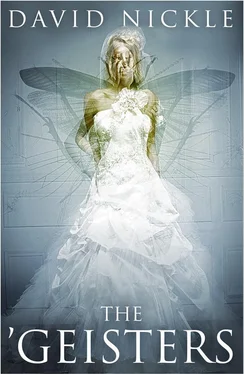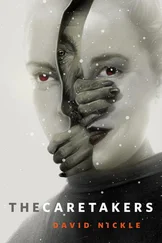“Oh Annie,” she said, whimpering, “you… you’re not you. You… you faded. And now—it’s the Insect in you, isn’t it? It got back in. And now that’s all there is.”
Ann considered that.
“I don’t think I’ve faded,” she said. “No. And as to the Insect being back in me?” She shook her head. “There’s no such thing as the Insect. There’s only me. There was only ever me.”
Susan kept backing away. Ann followed, keeping the same distance between the two of them.
“Do you want to save Ian’s life?”
“I don’t want you to kill him,” said Susan.
“I never intended to kill him. Or save him.” Ann stopped in the middle of the room, under the great bowl of its roof. “I thought I’d leave that to you.”
Susan’s eyebrows rose and she looked down, as though she’d worked something out.
“He’s in what’s left of the Octagon,” said Ann, helpfully. “You are too.”
To Ann’s disappointment, the last part was lost on Susan. “Thank you,” she said, and turned and half-ran across the room, and down the hall that led to the bridge. Ann sighed, and let her eyes flutter again—and watched as Susan ran a short distance farther, then come up short, on the empty space between the conference centre and the Octagon ballroom. The bridge had been torn down, and now there was nothing but twisted metal and fractured timber, tumbling down into the ravine. The Octagon loomed on the other side—literally, a smoking ruin. Susan fell to her knees and wept.
Ann shook her head. She shouldn’t have been surprised. Susan played Skyrim, and World of Warcraft. She was used to being led along a path. She was not a dungeon master.
There might have been a time that she had the capacity. But that time was past. Susan and her ’geist Little were two things now. Two things they would remain, until they found the courage to embrace one another.
And Ann had been wasting her time talking to Susan.
Ann left her wine glass on the table in the conference centre. She returned to the tasting bar, and hefted the urn containing Michael’s ashes. It was heavy but not burdensome, all things considered; after checking to see that the lid was screwed on tightly enough, she tucked it under her arm, and headed away from the Octagon, and poor despairing Susan Rickhardt, back to the meeting rooms at the far end of the conference centre.
With the electricity down, the hallway was a veil of shadows. Ann held the urn tighter, and stepped through. She could make out the shape of a bannister and the first few steps of a stairway to her left, but ahead, it was all darkness. It brought to mind the high school where Philip had dwelt. Except instead of classrooms and lockers lining the walls, there were big doors to meeting rooms and uncomfortable little benches along the way. Would the doors swing open suddenly, lighting some terrible spectre that ran towards Ann down the corridor, from the gymnasium?
No.
Ann took a step and two wall sconces to either side flickered to life—the hidden bulbs casting an irregular glow like gaslight. She smiled, and continued, and as the next set of sconces lit up, the last pair went dark, with the popping sound of cracking bulbs. If they’d been in a linen closet in the Lake House, they might’ve started a fire. They still might here, Ann thought as the second set of bulbs cracked. She stepped up her pace, and that seemed to do the trick; the light followed her down the hall, leaving the darkness behind her and cutting the darkness ahead.
She passed doors: the Pinot Grigio room, the Chardonnay Room, the Merlot. All of them were shut fast. She thought about opening them, and in response, the Amarone Room’s door handle cricked down. But Ann didn’t really want to look inside, see another poor wretch like Susan passing the time. So the handle returned to its place, and Ann left it in darkness with the rest of them.
Finally, the hallway ended and she reached another set of double doors—these ones glass-panelled. Beyond, she could see a dimly lit reception area, with a long desk as you’d find in a hotel, more comfortable chairs. There were windows here, and another set of glass doors, leading outside. Ann pushed on the first set of doors twice. The first time they were locked. The second, they opened easily.
The last few drops of rain pattered softly as Ann stepped out of the conference centre, onto the gravel of the parking lot. The woods rose up around the lot untouched, limbs bare but undisturbed by anything other than a moderate breeze. There were a dozen cars in the parking lot; some of them looked expensive. The camper van sat between two more modest vehicles—a cherry red Toyota hybrid and a deep blue Town Car. The van needed a good wash, even after all that rain.
There wouldn’t be any more rain for a while. As she stepped into the middle of the lot, and set the urn containing Michael’s ashes down in front of her, the clouds began to thin. They drifted apart in gossamer strands, to reveal a wintery blue bowl of a sky.
She looked up, and waved.
Philip did not wave back. He was too far up for it to be visible in any event—drifting against the winds like a kite on a string.
But Ann knew he hadn’t waved; she hadn’t allowed it.
He could wait for her—on the knife edge of love and of terror. He could wonder, as she had wondered.
Which way would it go?
THE END
Each novel is a different game for me, but there is a reassuring consistency to the people who help and support and love, and thereby earn my gratitude each time. So it is with The ’Geisters . The members of the Cecil Street writers’ group and the Gibraltar Point summer writers’ group all gave excellent advice: to whit, Madeline Ashby, Michael Carr, Laurie Channer, Rebecca Maines, John McDaid, Elizabeth Mitchell, Janis O’Connor, Helen Rykens, Karl Schroeder, Sara Simmons, Michael Skeet, Jill Snider Lum, Dale Sproule, Rob Stauffer, Caitlin Sweet, Peter Watts and Allan Weiss all share much of the credit and none of the blame for the contents of this book. That goes double for Sandra Kasturi, who’s edited all my books to within an inch of their lives so far, and has at various points brought this one back from the dead. ChiZine Publications has, as usual, delivered along with Sandra, a crew of phenomenal artists, editors, publicists and publishers in the persons of Erik Mohr, Kelsi Morris, Brett Savory, Helen Marshall, Laura Marshall, Sam Beiko, Danny Evarts, Michael Matheson, and Beverly Bambury, who contributed to both the genesis of this project and the launch of the last one in 2012, in a continuum of support, encouragement and aid. The phenomenal singer/songwriter Kari Maaren composed and performed a theme song for The ’Geisters —I had it on a nearly continuous loop during the final edits in early 2013. And of course my agent Monica Pacheco and the Anne McDermid Literary Agency provided consistently excellent support, advice and representation.
David Nickle is the author of numerous short stories and several novels. He lives in an east-end Toronto hayloft with science fiction author Madeline Ashby and a very bad cat, and spends his days covering Toronto city politics for the Toronto Community News chain of community papers. He has at least one more novel in him. Possibly more.

RASPUTIN’S BASTARDS
978-1-926851-66-2

MONSTROUS AFFECTIONS
978-1-926851-79-2

EUTOPIA
978-1-926851-94-5
Читать дальше















